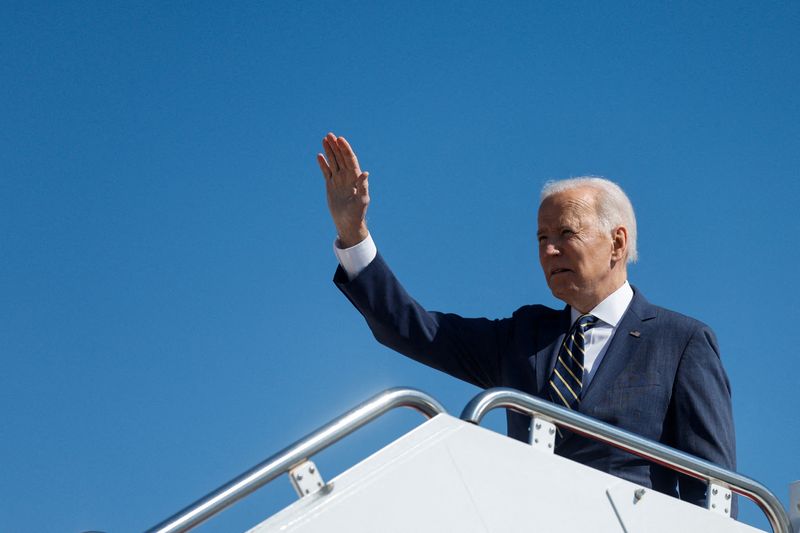By Steve Holland and Francesco Guarascio
WASHINGTON/BRUSSELS (Reuters) - The United States, European Union and other allies on Friday escalated their economic pressure on Russia, moving to strip Moscow of privileged trade and economic treatment among other steps to punish it for its invasion of Ukraine.
U.S. President Joe Biden said the new actions collectively will further hobble a Russian economy already weighed down by previously announced international sanctions that have cratered the rouble and forced the stock market to close.
Referring to ending normal trade relations, Biden said: "Doing it in unison with other nations that make up half of the global economy will be another crushing blow to the Russian economy that's already suffering very badly from our sanctions."
The measures announced by the EU, the United States and other G7 allies amount to a fourth set of sanctions against Russia over the Feb. 24 invasion.
They include efforts seeking to end Moscow's "most-favored nation" trade status, opening the door to banning or imposing punitive tariffs on Russian goods and putting Russia on a par with North Korea or Iran.
They will also ban luxury goods from being exported from their countries to Russia, designed as a blow to Russian elites.
As a first step, the EU will prohibit imports of iron and steel sector goods from Russia. European Commission President Ursula von der Leyen said the EU was also working to suspend Russia's membership rights of leading multilateral institutions, including the International Monetary Fund and the World Bank, and crack down on its use of crypto-assets.
A U.S. ban on luxury exports to Russia and its ally Belarus - including high-end watches, vehicles, clothes, alcohol and jewelry - takes effect immediately, the Commerce Department said.
The U.S. Congress would need to pass legislation to revoke Russia's trade status, and lawmakers have been moving in that direction. The United States also moved to shut down development funds while announcing a ban on imports of Russian seafood, vodka and diamonds, too. The White House said Biden would ban U.S. investment in Russia beyond the energy sector.
Top U.S. imports from Russia included mineral fuels, precious metal and stone, iron and steel, fertilizers and inorganic chemicals, all goods that could face higher tariffs once Congress acts to revoke Russia's favored nation trade status.
The United States also imposed sanctions on more Russian oligarchs, leaders and elites, targeting members of the lower house of parliament and billionaire Viktor Vekselberg, among others. Those hit with the new sanctions include 10 people comprising VTB Bank's board, 12 members of the Duma and family members of Kremlin spokesman Dmitry Peskov, the U.S. Treasury Department said.
Russian forces invaded Ukraine last month in the biggest assault on a European state since World War Two. Russia calls the action a "special operation."
"Russia cannot grossly violate international law and expect to benefit from being part of the international economic order," the White House said in a statement.
The United States also imposed fresh North Korea-related sanctions, targeting Russian individuals and companies after U.S. and South Korean officials said Pyongyang had used its largest intercontinental ballistic missile system in two recent launches.

Meanwhile, Britain imposed sanctions on 386 members of the Duma and also said it would seek to ban the export of luxury goods to Russia. The EU has already sanctioned the same group of lawmakers.
Britain's announcement said the sanctions targeted those who had voted to recognize the independence of Ukraine's largely Russian-speaking breakaway regions of Luhansk and Donetsk in the run-up to the invasion.